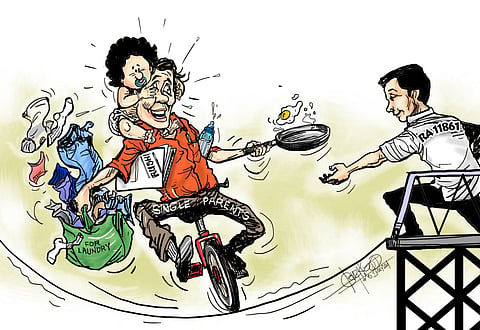
- NEWS
- the EDIT
- COMMENTARY
- BUSINESS
- LIFE
- SHOW
- ACTION
- GLOBAL GOALS
- SNAPS
- DYARYO TIRADA
- MORE

It’s about time that Republic Act 11861, or the Expanded Solo Parents Welfare Act, was enforced.
The Expanded Solo Parents Welfare Act, signed into law less than two years ago by former President Rodrigo R. Duterte on 4 June 2022, should have breathed new life into the longstanding Solo Parents Welfare Act of 2000 by expanding the scope of applicability and providing more benefits to solo parents and their families.
For some reason, it took a year and 10 months to blow a fresh breeze through the stagnant room when Social Welfare and Development Secretary Rex Gatchalian announced that the Inter-Agency Coordinating and Monitoring Committee (IACMS) will convene this week to discuss the Implementing Rules and Regulations and expedite the enforcement of RA 11861.
The Act covers various categories of solo parents, including those who provide sole parental care, unmarried parents, legal guardians, and relatives who assume parental care and support. The expanded Act extends the dependent age threshold to twenty-two years and broadens the definition of “spouse” to include partners in common-law relationships.
Solo parents are entitled to a monthly cash subsidy, discounts on baby and medical supplements, and coverage under the National Health Insurance Program.
In a game-changing move, the required period of service for parental leave has been slashed from one year to just six months in the workplace. Employers are now encouraged (but not mandated) to explore telecommuting agreements with solo parent employees, as outlined in Republic Act 11165. Additionally, in education, every child of a solo parent is eligible for scholarships offered by DepEd, CHEd and TESDA, with priority access to government educational programs thereafter.
To ensure compliance and fairness, the Act cracks down on individuals or entities that deny rightful benefits to solo parents. Penalties await those who misrepresent their status, falsify documents, or interfere with others’ access to the Act’s provisions.
Millions of Filipinos tread the challenging path of single parenthood. According to recent research conducted by the Department of Health and the University of the Philippines-National Institutes of Health, there are almost 15 million single parents in the Philippines, 95 percent of whom are women.
Being a solo parent is like juggling flaming torches while riding a unicycle — it’s no easy feat. Just picture a single dad named Alex, wrangling his two little girls all on his lonesome. Alex works full-time as a mechanic, logging long hours to make ends meet and provide for his family. On top of his demanding job, Alex is responsible for all the household chores, from cooking and cleaning to helping his daughters with their schoolwork.
The toughest part for Alex? The lack of a co-pilot in the crazy parenting ride. Without a partner to tap in, Alex is running on fumes, struggling to find a moment for himself amidst the chaos. And don’t even get him started on the financial tightrope he’s walking — one income, a million expenses. From school fees to medical bills, the costs can quickly add up.
That’s where the government needs to swoop in like a superhero and enforce the Solo Parents Welfare Act — a safety net for solo parents like Alex, offering a lifeline of financial aid, healthcare support, and more.
By giving Republic Act 11861 some muscle, the government can truly make a difference in the lives of single parents, ensuring they have the backup they need to rock this solo parenting gig.
As the IACMC gathers this week, may they do so with a sense of urgency. The clock is ticking, and the stakes are high for the Alexes of our country. Every parent deserves a helping hand, especially those doing it alone.
Similar to signage on a road rehabilitation project, the IRR for Republic Act 11861, or the Expanded Solo Parents Welfare Act, also needs one that reads — “Government project, do not delay.”
